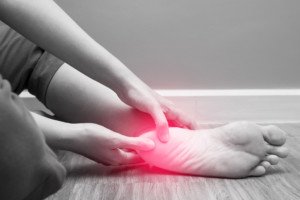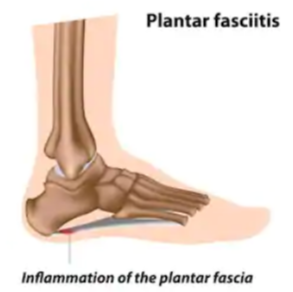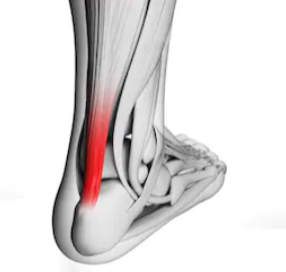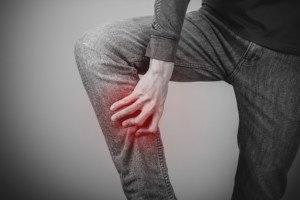
Top 5 Causes of a Burning Type of Pain in the Heels
“Burning pain in the heel can be an array of problems,” says Joseph Ciccone DPT, CSCS, a doctor of physical therapy and certified strength and conditioning coach with ColumbiaDoctors in New York, NY.
1 Plantar Fasciitis
The first up is, not surprisingly, plantar fasciitis, a more common cause of burning in the heel, says Ciccone.

Shutterstock/Alila Medical Media
He adds that plantar fasciitis can be caused by “running on hard surfaces, not changing running path/route frequently, not changing shoe wear when it is appropriate, changing running pattern, i.e., switching to a forefoot runner without proper staged progressions, not having appropriate shoe wear or support.”
2 Obesity

Shutterstock/Motortion Films
Obesity is another cause of plantar fasciitis, along with “playing sports where you need a lot of foot push-off — example basketball, racquet sports, runners — starting an exercise program without proper guidance; example: starting too aggressively.”
3 Achilles Problems
The third possible cause of burning heel pain is Achilles tendonitis/tendonopathy.

Shutterstock/Sebastian Kaulitzki
Ciccone explains, “Many people are over-pronators and need support to correct foot abnormalities, which can cause stress on plantar fascia and/or Achilles tendon — an example of this would be someone with forefoot varus (bone alignment abnormality in the toes).”
Over-pronation refers to rolling the inside part of the foot inward as you walk or run.
4 Haglund’s Deformity
The fourth possible cause of burning pain in the heels is that of Haglund’s deformity, a protruding or enlarged area on the back of the heel bone.
This growth can cause irritation and pain where the Achilles tendon attaches to the heel.
Wearing shoes with high heels, plus foot mechanics and genetics may contribute to this condition.
5 Arch Problems
No.5 is a pes planus (flat foot) or pes cavus (high arch).
Flat feet: Instead of the usual curve in the middle of the foot, the entire sole may touch the ground. This can be a condition from birth or develop over time.
High arch: This often means that only the heel and ball of the foot make contact with the ground, while the rest of the foot is elevated.
Bonus Cause: Tight Calves

Shutterstock/Shaynepplstockphoto
The sixth likely cause of a burning sensation in the heel would be tight calf muscles — those of the gastrocnemius and soleus muscles.
Tightness in these muscles can actually lead to plantar fasciitis, which is notorious for a sensation of burning in the heel.
To perform an effective calf stretch, face a wall with your hands pressed against it for support.
Position one foot forward and extend the other leg back, keeping the heel of the back foot firmly on the ground and the toes pointing straight ahead.
Gently lean into the wall while bending your front knee and keeping the back leg straight.
You should feel a stretch along the calf of your back leg.

Freepik/katemangostar
Hold this position for 15-30 seconds, then switch legs.
This stretch helps lengthen the calf muscles and can help relieve burning in the heel.



































